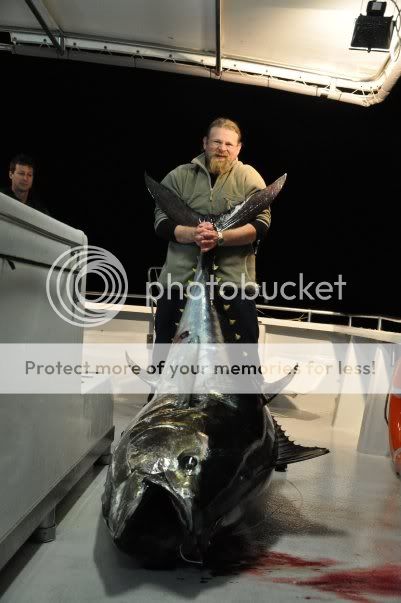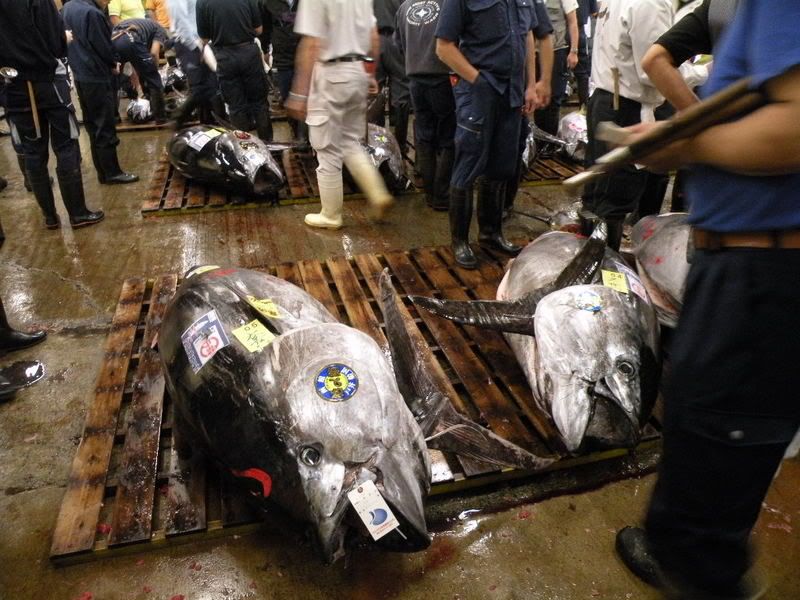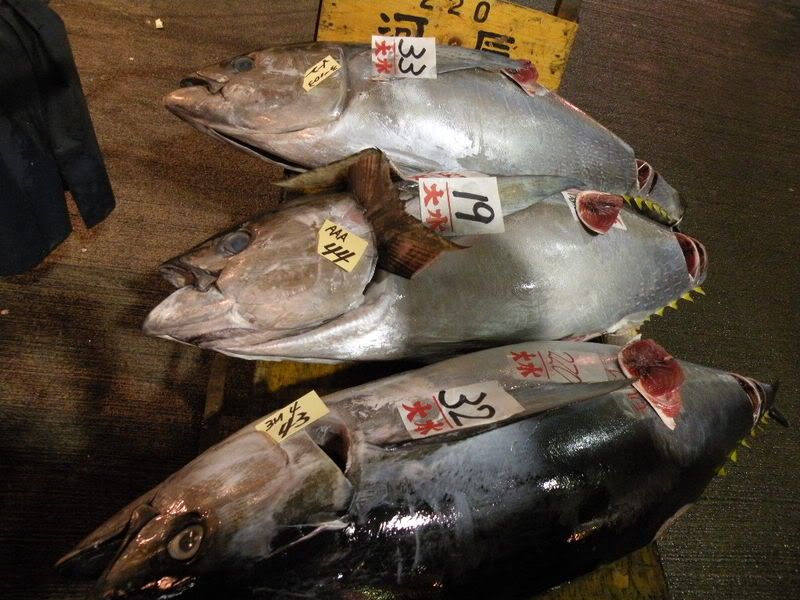COVER STORY: A TUNA CARTEL?
Pacific states borrow OPEC idea to fix tuna price.
http://www.islandsbusiness.com/isla...D=18728/overideSkinName=issueArticle-full.tpl
Samisoni Pareti
Asserting control...PNA member countries agreed to form a tune corporation with the aim of controlling the supply of tuna on the world market.
What began as a dream some years ago is becoming a reality for some Pacific islands countries; the formation soon of the world’s first cartel on tuna.
At a landmark decision in Niue last month, eight islands nations agreed to form a tuna corporation with the ultimate aim of controlling the supply of tuna on the world market.
Such a corporation, when it comes into being, will oversee all stages of tuna processing, from harvesting of raw tuna to marketing of the finished products.
Behind the development are the Federated States of Micronesia, Kiribati, Marshall Islands, Nauru, Palau, Papua New Guinea, Solomon Islands and Tuvalu—members of the Parties to the Nauru Agreement (PNA).
The eight are owners of the largest 200-mile exclusive economic zones (EEZ) in the Pacific Ocean and thus lay claim to the greater portion of the world’s last remaining healthy stocks of tuna.
The Pacific supplies half of the world’s tuna needs, it is estimated.
Already, the government of Papua New Guinea through its National Fisheries Authority has pledged US$1 million to go towards the establishment of a PNA secretariat.
This, the islands hope, will pave the way for the proposed Tuna Corporation that all eight islands countries will own.
Once this happens, they will control pricing in much the same way as OPEC—the Organisation of Petroleum Exporting Countries—controls oil supplies to influence prices today.
“The strategic direction of PNA continues to evolve and could potentially include amongst other things the evolution of a cartel that would control the supply of tuna from their waters, the establishment of a PNA Tuna Corporation and registration of FADs as a pre-condition of fishing in their waters,” explained a briefing paper put before PNA Ministers of Fisheries at their Niue meeting.
“The relationship between PNA and the fishing states is also changing. It is becoming more commercially oriented and complex.”
Assert control
FADs is an acronym for fishing aggregate devices, a floating platform fishing boats employ to attract tuna.
PNA members agree with Greenpeace Pacific that such forms of industrial fishing lay waste to large numbers of juvenile tuna and other marine life such as sharks and turtles in the region.
As part of strategies to assert more control on how tuna is fished in their waters, Pacific islands countries led by PNA members imposed controls on the use of FADs. From this year, FADs will not to be used for two months in a year.
PNA is also leading efforts to control the amount of tuna harvested in its waters through what it is calling the Vessel Day Scheme (VSD).
Through a formula drafted by the Secretariat of the Pacific Community (SPC), each PNA member is allocated a quota of fishing days per year.
This quota is then sold or auctioned to interested fishing companies largely owned by distant water fishing nations (DWFNs).
“The PNA must be able to respond to the realities of these changes in a way that allows it to continue to be at the forefront of tuna fisheries management and development in the region through the advocacy of fisheries development aspirations,” the PNA briefing paper obtained by ISLANDS BUSINESS stated.
“An example is the implementation of the Vessel Day Scheme (VDS), in particular, the need to have more complex applications to the trading of days amongst the parties. This might involve the establishment of a vessel days trading stock exchange mechanism.
“Furthermore, one aspect of the changing nature of the relationship between PNA and other stakeholders would also be to explore commercial arrangements between PNA and major tuna processors.
“This would effectively reduce the control that tuna operators have in the fishery and could significantly transform the fisheries dynamics in the region, entrenching their long-held aspirations to control the region’s fisheries.”
Tuna cartel
Talks of a tuna cartel had actually begun in earnest in South Korea last December at the margins of the Fifth Session of the Western and Central Pacific Fisheries Commission (WCPFC).
WCPFC is the other regional fisheries body whose mandate covers tuna conservation oversight in waters not covered by the Pacific islands’ EEZs, what many refer to as the high seas.
The commission brings together harvesters and owners of tuna; DFWNs—Canada, China, European Commission, France, Japan, Korea, Philippines, Taiwan and the United States on one side, and the 17 Pacific islands who are members of the Pacific Islands Forum Fisheries Agency (FFA) including Australia, New Zealand and Tokelau, on the other. All eight PNA states are key members of FFA.
At that meeting in Busan, South Korea, delegates from the Marshall Islands outlined the need for a PNA secretariat.
It offered to host the new body in its capital Majuro and that the secretariat should be up and running by the end of this year.
As to how the new PNA secretariat would be funded, documents obtained by ISLANDS BUSINESS revealed very little.
Under the PNA Coordinator budget, a briefing paper did propose an amendment to PNA’s current agreement with the FFA in that bulk of the coordinator’s budget should come from VDS (Vessel Day Scheme) earnings.
For now, the PNA coordinator is funded by 50% of VDS funds, 25% each from PNA states and fees paid by Pacific domestic fishing vessels under a treaty that is known as the FSM Arrangement.
The coordinator’s budget for 2008/2009 is US$297,327.
Special need
Will the formation of the secretariat and indeed the Tuna Corporation weaken the purpose and focus of FFA?
PNA officials had a lot to say about this, justifying the special need to have its own body while at the same time affirming their commitment to the work of the Honiara-based regional organisation.
“The establishment of a PNA secretariat will strengthen the FFA region through the enhancement of the strategic leadership role the FFA region plays in conservation and management,” said another PNA brief.
“The PNA secretariat will not be assuming the functions and responsibilities of the FFA secretariat.
“The PNA secretariat will supplement and complement, thereby enhancing the FFA secretariat’s technical and advisory services.”
Another document offers an opinion on the legal status of the proposed PNA secretariat in light of the text of the Parties to the Nauru Agreement, as well as the proposed secretariat’s standing with the FFA.
“The [Parties to the Nauru] agreement does not stipulate that the FFA shall be the secretariat of the agreement, rather it directs the parties to “seek the assistance” of FFA to provide such services to implement and coordinate the provisions of the agreement.
“The original intent was to minimise costs, utilise existing facilities and give the Director of FFA administrative charge of meeting arrangements for the parties.”
What the remaining nine members of the FFA think of this move by PNA states is unknown.
PNA’s decision to form its own secretariat with the ultimate aim of establishing a tuna cartel is yet to appear on the agenda of any FFA meetings.
FFA’s deputy director Dr Transform Aqorau agreed with the current PNA thinking that the two organisations complement each other.
“Our work at FFA covers matters relating to fisheries policy and technical support,” said Dr Aqorau when contacted by telephone at FFA headquarters in Honiara late last month.
“PNA members, on the other hand, want to take on a more commercial focus in order to manage their tuna resources.
“Differences might arise in the future if PNA becomes stronger but there’s hope the demarcation of our roles will remain.”
If developments in other sectors are any guide however, then a PNA secretariat would be the source at the very least of some disquiet among non-PNA members.
Success rate
At the 2007 Pacific Islands Forum in Tonga for instance, Samoa wanted the Pacific Islands Forum Secretariat to look into the wider implications of forming sub-regional groupings.
Prime Minister Tuilaepa Lupesoliai Sailele Malielegaoi was particularly anxious then about the Melanesian Spearhead Group and its high profile position in negotiations for regional trade agreements.
With Tuvalu the sole Polynesian member of PNA, some fear the old Polynesia/Melanesia rivalries will only be perpetuated.
There is no doubt that since its formation some 27 years ago, PNA has developed into a powerful negotiating bloc within the FFA and WCPFC when it came into being in 2004.
Many of the regional initiatives aimed at controlling tuna fishery in the Pacific were PNA proposals.
This include its declaration late last year of the closure from January 2010 of two high seas pockets.
The decision to extend that ban to two more high seas pockets is to be discussed in December this year.
High seas pockets are waters that are uncovered in any of the countries’ recognised 200-mile EEZs as provided for under the United Nations Law of the Sea Convention.
Banning FADs for two months in a year is another PNA concept, as is the regional register of foreign fishing vessels, a harmonised minimum terms and conditions of access by foreign fishing vessels, the FSM Arrangement for regional access and the Palau Arrangement for the management of the Western and Central Pacific purse seine fishery.
One hundred percent placement of Pacific observers on foreign purse seiners is another significant achievement as well as VDS.
What could be the reason for the high success rate of PNA as a regional sub-group?
Dr Aqorau believes it is all about empowerment, eight islands states—most of them small and vulnerable—recognising the lucrative resource they have and acting in unison to manage that resource.
“In my mind, it is the same principle you see in forestry, mining and other resource-based sectors where resource owners feel empowered to take control of their resources.
“Today, the dynamics in fishery are so much different from say 20 years ago.
“In those days, we were still trying to organise ourselves.
“We didn’t have tools for monitoring tuna for example and above all, there was no organisation to look after conservation of tuna like we now do with WCPFC.”
“In wanting to form a cartel, what PNA members are doing is basically taking the conservation measures of WCPFC and turning them to maximise economic returns.”
Another reason behind PNA’s high success rates is to do with the good response from some DWFNs.
South Korea had indicated its desire to engage with Pacific islands states on the matter of “domestication”, a reference to the policy of planting tuna processing plants in the islands.
Japan is also receptive to the PNA concept, offering to match the bloc’s tuna cartel idea with its own “islandisation” initiative.
Fisheries treaty
The matter is expected to be included in a MOU Japan is negotiating with PNA states and the ‘islandisation’ concept is due to be thrashed out by both parties in 2010.
Under it, Japan like South Korea wants to develop a long-term relationship with the eight Pacific islands members of PNA.
Building canneries in the islands is part of Tokyo’s ‘islandisation’ plan. But not all DWFNs share the enthusiasm of Tokyo and Seoul.
The United States, through its multilateral fisheries treaty with FFA members, is a hindrance. At least that’s the view of PNA states.
Since its fishing agreement with Pacific members of the FFA came into force in 1987, US boats can fish in the Pacific for a fee of US$3 million per annum. The maximum number of US boats was pegged at 40.
This, however, contradicts the VDS provision of WCPFC, which uses the number of fishing days and not the number of fishing boats as a more sustainable method of managing tuna resources.
PNA now wants the US to revert to VDS, and not the treaty’s 40 purse seiners as the benchmark, a move Washington through its powerful Tuna Association is resisting.
Some PNA members led by Papua New Guinea claim the US treaty is being abused by unscrupulous operators to bypass the stringent fishing day quota offered under VDS.
“In 2004, there were no more than 22 boats fishing under the US treaty,” said Sylvester Pokajam, managing director of PNG’s National Fisheries Authority.
“Today, there are 40 boats fishing and some of these we know are former European, Korean and Taiwanese-owned boats now fishing in the Pacific using the US flag.
“This is clearly unacceptable and unsustainable and the view of my government is that we must re-negotiate the full text of the US treaty.”
This treaty is not due to expire until 2013 but negotiations on its future will begin in October this year.
Housekeeping issues
For Pokajam, some fishing boat owners see the loophole in the stringent measures of VDS through the US treaty and are clearly exploiting it.
“If a boat operating under VDS is only allocated 250 days of fishing in one year and you have these 40 US boats fishing un-restrained all throughout the year, then you tell me whose interest is being served?” asked Pokajam.
“Before we start working towards this long-term goal of a tuna cartel, this is one housekeeping matter that members of PNA ought to resolve first.”
The other ‘housekeeping’ issue the PNG senior fisheries expert wanted determined is the current formula offered by the SPC (Secretariat of the Pacific Community) under VDS.
He said the current formula based on 50% of total catch and 50% of biomass is not fair as it results in the uneven distribution of fishing days to PNA member countries.
“Forming a cartel is, of course, the way to go as it will allow us to achieve our aspirations in the development of our own on-shore fish processing plants.
“On the other hand though, we will need to watch that we don’t push the price of tuna so high that it becomes expensive and drive buyers away.
“We have to strike the right balance,” added Pokajam.
When he first came into office five years ago as president of Kiribati, Anote Tong spoke to this magazine about his desire to see the formation of a tuna cartel in the region.
“Increasing the fishing effort in our EEZs is contrary to the provisions of the Law of the Sea Convention in terms of preserving the resource,” President Tong said in the ISLANDS BUSINESS’ July 2004 cover story.
“So the only other way to do it is to increase our returns from the lower volume of fish taken from our EEZs.
“In other words, reduce the fishing quota and increase our return from the lower catch.
“This will ensure value-adding.”
Interestingly, it was Kiribati who floated the idea of a Tuna Corporation at a PNA meeting in May last year.
Its recent meeting in Niue was chaired by Taberannang Timeon, currently Kiribati’s Minister for Fisheries and Marine Resource Development.
“The PNA has come together as owners of one of the last remaining healthy tuna stocks in the world to increase the economic gains from tuna,” an FFA press statement quoted Timeon as telling delegates at the Niue meeting.







